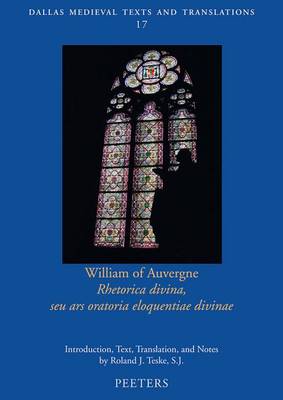Dallas Medieval Texts and Translations
1 primary work
Volume 17
William of Auvergne, Rhetorica divina, seu ars oratoria eloquentiae divinae
by R. J. Teske
Published 26 March 2013
This volume contains Professor Roland Teske’s translation of William of
Auvergne’s Divine Rhetoric along with the Latin text,
introduction, and notes. The Latin text improves on that of the 1674
printed edition by the use of two early manuscripts of the work. William
was a theologian at the University of Paris and bishop of Paris from
1228 until his death in 1249. He is mainly known for his huge Teaching
on God in the Mode of Wisdom, in which he made extensive use of the
works of Avicenna and Aristotle as they were becoming known through
translations in order to come to some understanding of the Christian
faith and philosophy. Although the majority of his writings focus upon
the mysteries of the faith and philosophical questions about the nature
of human beings, their God, and their world, William was also a bishop
with a deep concern for his clergy and people. In his Divine Rhetoric
he aimed to explain and illustrate for his priests and people the art of
prayer or, as he put it in the subtitle, The Oratorical Art of Divine
Eloquence. The work lists and explains seven characteristics or
perfections of prayer, but it is perhaps best known for its application
of Ciceronian rules of oratory to Christian oratory or prayer.
Auvergne’s Divine Rhetoric along with the Latin text,
introduction, and notes. The Latin text improves on that of the 1674
printed edition by the use of two early manuscripts of the work. William
was a theologian at the University of Paris and bishop of Paris from
1228 until his death in 1249. He is mainly known for his huge Teaching
on God in the Mode of Wisdom, in which he made extensive use of the
works of Avicenna and Aristotle as they were becoming known through
translations in order to come to some understanding of the Christian
faith and philosophy. Although the majority of his writings focus upon
the mysteries of the faith and philosophical questions about the nature
of human beings, their God, and their world, William was also a bishop
with a deep concern for his clergy and people. In his Divine Rhetoric
he aimed to explain and illustrate for his priests and people the art of
prayer or, as he put it in the subtitle, The Oratorical Art of Divine
Eloquence. The work lists and explains seven characteristics or
perfections of prayer, but it is perhaps best known for its application
of Ciceronian rules of oratory to Christian oratory or prayer.
